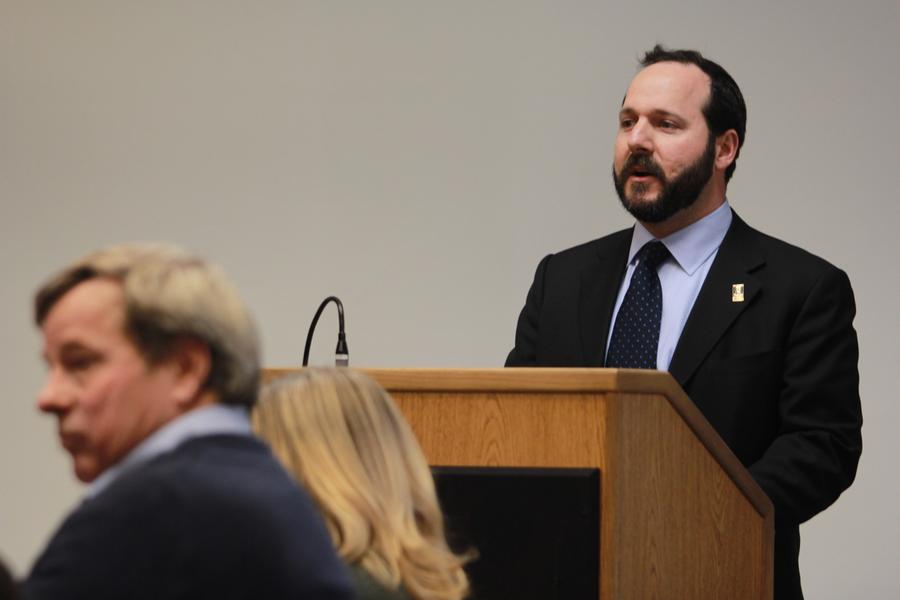
Interim Chancellor Hank Foley spoke to Faculty Council at its Thursday meeting, less than two hours after the [announcement that Melissa Click had been fired](https://www.themaneater.com/stories/2016/2/25/melissa-click-fired-board-curators/) by the UM System Board of Curators. During his 40 minutes at the podium, Foley fielded questions from both the council and audience members about the process of Click’s firing.
At the beginning of the meeting, Faculty Council Chairman Ben Trachtenberg said he believed the Board of Curators made a “terrible decision” in deciding to fire Click.
“Regardless of one’s position or opinion on professor Click’s behavior fitness for duty, she was entitled by the rules — rules that the Board of Curators approved — to a fair process,” Trachtenberg, a law professor, said. “That she did not receive. The UM System statement announcing the firing notes that Click’s behavior at the October Homecoming parade contributed to the decision to fire her. In my opinion, whatever you think of her involvement in the protest, her participation and even her somewhat coarse language is constitutionally protected … If I am correct then her firing is motivated, at least in part, by her First Amendment rights.”
Trachtenberg said that by suspending Click on Jan. 27 and then firing her on Feb. 25 after [Foley said she wouldn’t be suspended without due process](https://www.themaneater.com/stories/2016/1/25/interim-chancellor-foley-addresses-assault-charges/) and interim UM System President Mike Middleton said she shouldn’t be fired, the board had undermined the authority of both administrators.
Foley said he didn’t think they had undermined his authority.
“I think they did the right thing,” Foley said.
Citing the UM System’s Collected Rules and Regulations, Trachtenberg said that any faculty or staff member could be terminated by the board at any point in time, with or without reason.
“The implication of that is that the entire tenured faculty could be fired tomorrow,” Trachtenberg said. “And that is no way to govern a university.”
Foley said Click’s firing was only based on the investigation that had taken place, and not a result of political pressure. He also said that she was not fired just because of her speech.
“The board undertook an investigation as a response to the charges that were brought against her by the local prosecutor (and the board) made the decision from that basis,” Foley said. “The board did not make the decision on speech … but her overall behavior.”
After being asked if faculty should be concerned about their jobs since the board has the right to terminate anyone with or without reason, Foley called the situation of Click “highly unusual.”
“It’s the intention of the board never to do anything like this again,” Foley said.
Faculty members repeatedly asked Foley to clarify how he knew the board would never act similarly again. Foley said he didn’t know.
Foley also said he didn’t expect faculty to change their viewpoints, but to be aware of how they expressed their viewpoints.
“Be very mindful of the fact that you’re being recorded and that your behavior will be judged,” Foley said.
Council member and astrophysics professor Angela Speck questioned who should be the judge of what is acceptable to say and said that faculty should be able to stand up for students.
“Think about context,” Speck said. “Click acted in protection of students. Who gets to say this is unacceptable? Someone needs to explain where the lines are.”
“Well, we’ll be working on that,” Foley said.
Many faculty members voiced their unhappiness with Foley.
“You just threw the faculty under the bus,” council member and psychology professor Jeff Rouder said after Foley discussed faculty being mindful of being recorded. “I’m really hot right now about this.”
Another audience member said she believed Click was being fired for “proxy racism.”
“This is damaging to black people,” she said. “This nonsense of talking around race has got to stop. This is proxy racism. And we need to start talking about the fact that we need to do right by our students; that we’re going to take out a professor — a white woman — who said, ‘I’m going to defend this space for black students who haven’t been heard’ … that is unacceptable.”
Questions directed to Foley also discussed other matters. At one point, a member of the audience referenced the football team’s November strike. The audience member asked Foley if MU wanted to keep “students of color in place” by not allowing students to go on strike in the future, citing a quote from a [Columbia Tribune story](http://www.columbiatribune.com/sports/university-of-missouri-tries-to-ensure-no-more-boycotts/article_b82a7187-617f-5c92-b0f7-80966a3e9d61.html).
“The paper quoted that the university was taking steps to make sure student activists do not go on strike,” the audience member said. “And so why is that necessary to say?”
Foley said that it was important to work to make black students feel a part of the community.
“(We want to) diversify the athletics staff … and be sensitive of needs of students of color,” Foley said.
Foley blamed the media for making it sound as if MU wanted people to keep students from striking.
“As often is the case, when things get quoted in the media, I think they’re often quoted incompletely and out of context,” Foley said.
Council member and Romance languages professor Flore Zephir asked Foley how one would go about firing a curator. Foley said he was unsure.
David Mitchell, the chairman of the UM System Diversity, Equity and Inclusion task force, said Click is often portrayed in a negative light, but many view her positively.
“A number of folks view this person as a heroine,” Mitchell said. “And I have to ask you, how sincere is the board in actually addressing the problems on campus?”
_Edited by Taylor Blatchford | [email protected]_